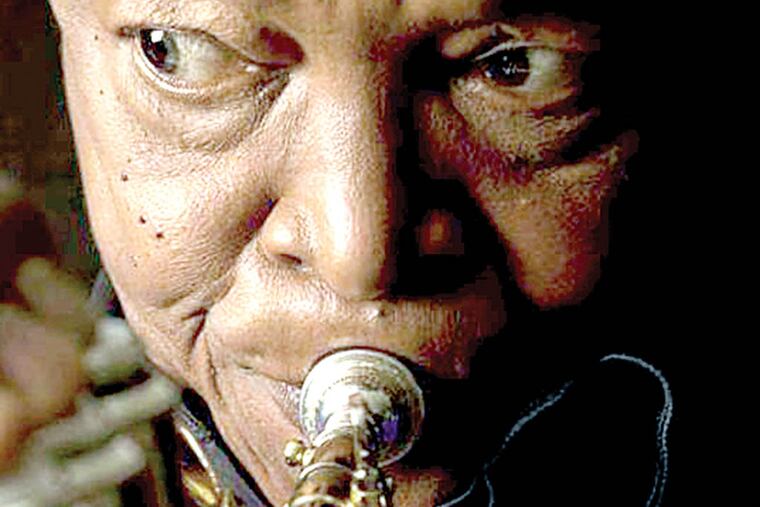Masekela and Mandela: Together (almost) forever
Afro-jazz icon Hugh Masekela comes round tonight, celebrating a big 75 and his good friend "Madiba."

SONGS AND stories about the late, great South African (and world) leader Nelson Mandela will be top of mind for Hugh Masekela tonight, as the trumpeter, singer and composer dedicates a show at the Sellersville Theater to his recently departed (in December) homeland friend and fellow freedom fighter.
But, in truth, Masekela's welcome return (just a year after a triumphant night at the Zellerbach) also should be a personal celebration.
Come Friday, this hale and hearty, still amazingly prolific Afro-jazz superstar turns 75, "with no intentions of slowing down," he recently shared, with a laugh. "I've got places in Los Angeles and Johannesburg where I do my laundry, but hotel rooms are still my home."
Underscoring his energy level, the man recently started his own record label, House of Masekela, with "Friends," a four-CD bonanza of standards putting him on the front line with another "longtime" bud, keyboardist Larry Willis.
The focus of "Friends" on songs like "Body and Soul," "Willow Weep for Me" and "You Make Me Feel Brand New" represents just one side of Masekela, a chameleon who's "always enjoyed all kinds of music" and "always been anti-labels."
Another recent Masekela album, "Jabulani," made a meal of jubilant African wedding songs.
"Ever since I landed in New York in the '60s, to attend the Manhattan School of Music [sponsored by his future wife Miriam Makeba and Harry Belafonte], guys like Miles Davis and Dizzy Gillespie counseled me that I should always emphasize my African roots in my music," he related.
That good advice helped power Masekela's first international hit, in 1968, "Grazing in the Grass." The peppery instrumental then helped ignite an explosion in world-music consciousness, spread by Masekela disciples from Fela Kuti to Paul Simon.
In concert tonight with his all-African band, Masekela's focus will likewise be on folksy, township-flavored jazz. The front man sings more than he plays these days - maybe the only "tell" of age taking its toll. "I've given some thought to quitting the horns and just becoming a crooner, with my own show in Las Vegas."
Funny business
Yeah, Masekela is quite a kidder. And so, surprisingly was his "friend since childhood" Nelson Mandela - "the driest, funniest guy I've ever known."
How so?
"With a straight face, Mandela would call himself 'the world's foremost authority on napping.'" And he urged Masekela to grab 20 winks whenever he could.
" 'The secret to napping,' he'd tell me, 'is you have to do it while sitting or standing up and almost unconsciously.' Back before he could afford a car, he'd do it standing up on a bus, and his fellow riders would nudge him awake when he got to his stop."
Maintaining "dignity" was never high on Mandela's priority list, clearly. Masekela recalled twice being in the company of Mandela (in his presidency years) and Britain's Queen Elizabeth II - first at a Royal Command performance in London that Masekela headlined, then at a dinner party on Her Majesty's royal yacht in Johannesburg's harbor.
"In London, Madiba [Mandela's clan name] got her on her feet in the royal box to do the 'Madiba Dance,' " Masekela gleefully recalled. "The queen really loved him, would follow him around like a puppy, do whatever he said. And on the boat, he repeatedly called her 'Liz,' never 'Your Majesty.' I said to him 'Madiba, how do you get away with that?' And he'd say, with a huge grin, 'Because she knows I'm a king.' "
Mandela would call on Masekela "sometimes at 5:30 in the morning" for help on all kinds of things, from being the front guy to buy a piano for Mandela's grandchildren "so they won't overcharge me," to advising the president on cultural matters.
A simple gesture
While Mandela suffered behind bars for decades for leading the movement to end South African apartheid, Masekela was forced into exile for 30 years. He left his homeland after the 1960 Sharpeville massacre of fellow protestors made Masekela fear for his own life.
"Madiba always kept his spirits up, stayed aware of what was going on outside the prison walls," Masekela recalled. "On my 46th birthday, he sent me a wonderful letter, wishing me an 'exceptionally happy birthday' and 'proudly congratulating' me on the music school and recording studio I'd started across the border in Gaborone, Botswana."
The thoughtful gesture from a man then in his 21st year of imprisonment "totally overwhelmed" Masekela. "With tears in my eyes I rushed to the piano and out poured this song":
Bring back Nelson Mandela! Bring him back home to Soweto! I want to see him walking down the streets of South Africa. I want to see him walking hand-in-hand with Winnie Mandela.
In time, that song would become a major anti-apartheid anthem and key piece of the Soweto-riots themed stage and movie musical "Sarafina!" But on the day it first came to him, the musician actually denied authorship.
"Hearing me sing it, my wife rushed in, all excited, and said 'When did you write that, Hugh?' And I said 'I didn't. Nelson just sent it to me.' "